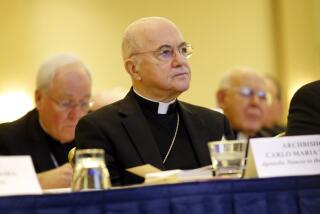Vatican resolute on Holocaust denier
LOS ANGELES AND MADRID — The Vatican stood firm Tuesday on a decision to rehabilitate a Holocaust-denying bishop, even as Jewish leaders warned that the move will set back decades of Roman Catholic overtures to mend strained relations between the two faiths.
The Vatican joined Jews and fellow Catholics in condemning the British bishop’s assertions that no Jews died in Nazi gas chambers. But the Vatican also said Richard Williamson’s ideas had nothing to do with the decision by Pope Benedict XVI to return him and three other traditionalist bishops to the fold.
The controversy over lifting the excommunication of Williamson came as people worldwide Tuesday observed an annual commemoration of the Holocaust.
The Vatican’s embrace of Williamson has incensed Jewish groups in the United States and Europe, who noted that Catholic-Jewish relations have warmed since the 1960s, when the Second Vatican Council issued a groundbreaking condemnation of anti-Semitism.
“This is an astounding departure,” said Rabbi Marvin Hier, founder of the Simon Wiesenthal Center in Los Angeles. “It violates all of the goodwill of Vatican II, where the church said that . . . the long history of hatred toward Jews, silence toward Jews during the Holocaust is a thing of the past.”
In an interview broadcast on Swedish television days before the pope lifted his excommunication Saturday, Williamson said: “I believe that the historical evidence is hugely against 6 million Jews having been deliberately gassed in gas chambers as a deliberate policy of Adolf Hitler. I believe there were no gas chambers.”
He added: “I think that 200,000 to 300,000 Jews perished in Nazi concentration camps, but none of them by a gas chamber.”
Williamson’s comments drew condemnation from Catholic bishops in Italy and Germany and from his own order, the Society of St. Pius X.
The leader of the society, Bishop Bernard Fellay, said in a statement that Williamson’s views did not reflect the society’s position. Fellay forbade Williamson to speak publicly and asked the pope’s forgiveness for “the dramatic consequences” of the bishop’s remarks.
Vatican spokesman Father Federico Lombardi said Williamson’s “unacceptable” ideas had “nothing to do with the thinking of the pope or the ideas expressed in the many documents of the church that condemn the Holocaust.”
He said there has been no talk of revoking the decision because it represents a first step toward eventual reconciliation with an entire religious community, not a single clergyman. “This regards an issue of the internal life of the Catholic Church,” Lombardi said in a telephone interview Tuesday.
Lombardi said the Vatican expected some negative response but has been surprised by the reaction. “We are sorry, and we hope that the Jewish world understands that this decision has nothing to do with Williamson’s ideas,” he said.
Williamson and three other bishops were excommunicated by Pope John Paul II 20 years ago after they were consecrated by an ultraconservative archbishop, Marcel Lefebvre, without papal consent. The Vatican viewed the step as a schismatic act.
Lefebvre, who opposed liberal reforms introduced by Vatican II, founded the Society of St. Pius X.
From the start of his pontificate in 2005, Benedict made it known that he wanted to reunite the society with the church, angering Jews in the process in 2007 when he relaxed restrictions on celebrating the old Latin Mass, which on Good Friday calls for the conversion of Jews.
Benedict made his announcement about the lifting of excommunication after Williamson’s interview aired. It was not clear whether he knew of the interview, but those familiar with the decision say he consulted only a few advisors.
Among those not in the loop, according to one source, was Cardinal Walter Kasper, who oversees the Vatican department that handles Jewish relations.
“The Vatican was not prepared for the firestorm that resulted,” said the Rev. Thomas J. Reese, a Jesuit priest and senior fellow at the Woodstock Theological Center at Georgetown University. “If the White House did this kind of thing, everybody would say they were tripping over each other and weren’t organized.”
The fallout among Jewish leaders continues.
“Given the centuries-old history of anti-Semitism in the church, this is a most troubling setback,” Abraham H. Foxman, the Anti-Defamation League’s national director and a Holocaust survivor, said in a statement.
Amid the outcry, the Vatican has moved swiftly to defend the pope’s decision and his record of condemning the Holocaust and anti-Semitism.
On Tuesday, Vatican Radio devoted a program to the Holocaust, highlighting the pope’s efforts to reach out to Jews, including his 2006 visit to the Auschwitz concentration camp in Poland.
Catholic leaders in the United States also denounced Williamson even as they endorsed the pope’s actions.
“We support the Holy Father’s decision to lift the censure,” said the Rev. James Massa, who oversees ecumenical and interreligious affairs for the United States Conference of Catholic Bishops. “Any division in the body of Christ that can be overcome is to be received with gratitude. This particular decision is made in the shadow of the unacceptable comments of Bishop Williamson.”
--
rotella@latimes.com
More to Read
Sign up for Essential California
The most important California stories and recommendations in your inbox every morning.
You may occasionally receive promotional content from the Los Angeles Times.










